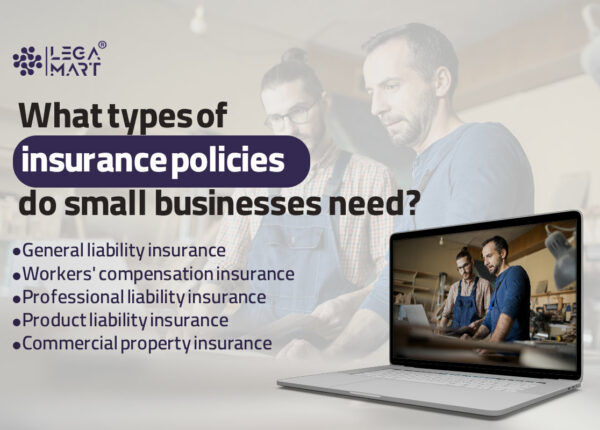Introduction
If you’re considering launching a small business, you’re no stranger to taking chances. Your entrepreneurial spirit is admirable and essential to maintaining our economy’s health. However, it’s also wise business practice to minimize risks whenever possible. In situations like these, business insurance can be helpful, and it is rather prudent to know essential tips on insurance contracts for small businesses beforehand. Insurance contracts are a vital safeguard for small businesses, protecting against unforeseen risks. However, navigating the complex world of insurance can be daunting, making it a critical area within Legal Practice & Specialization. Thus, to help small business owners make informed decisions, it is essential to understand some critical tips on insurance contracts. This ranges from selecting the right coverage to managing premiums effectively.
Do small businesses need insurance contracts?
The quick response is yes. If you have employees, it may be necessary by law to carry certain types of insurance, such as workers’ compensation and disability insurance. If you drive a work vehicle, you can also be obliged to obtain insurance. In other cases, having an insurance contract for small businesses may be a requirement for obtaining a business loan, lease, contract with a supplier or client, or a state or local company license.
However, there are frequently no laws, rules, or regulations requiring business owners to take sensible precautions to protect their enterprises. Because of this, almost 40% of small firms lack insurance. Therefore, to dissolve this impasse, LegaMart is here to help you get a jump start on safeguarding your small business with tips on insurance contracts for small businesses that will help you choose the right business insurance policy.
What types of insurance policies do small businesses need?

The type of coverage a company requires is based on various factors, including the nature of the business, the industry it operates in, and the number of employees.
Small business insurance providers offer a range of policies that can help protect companies against the risks they face. The selection is diverse, but according to industry experts, these are some of the most essential types of policies that businesses need to maintain their operations when accidents and calamities strike.
General liability insurance
General liability insurance is one of the most important coverages that small enterprises need, according to the US Small Business Administration (SBA). Sometimes referred to as business liability or public liability coverage, it protects companies against claims of bodily injury or property damage resulting from their business activities. Policies also cover reputational damage claims, including libel, slander, and copyright infringement.
Small businesses do not receive compensation for this type of coverage. Instead, the payouts are given to the affected third party. Without general liability insurance, companies will need to pay for the claims out of pocket.
Small businesses face an elevated risk of copyright infringements, particularly through social media platforms, in comparison to larger enterprises. Consequently, obtaining a comprehensive general liability insurance policy is imperative to mitigate potential legal challenges.
Workers’ compensation insurance
Small businesses with at least one staff member are required to take out workers’ compensation insurance. This pays out the cost of medical care and part of the lost income of employees who get sick or injured while performing their jobs. It also protects small businesses from the financial liability of paying for expenses stemming from work-related illnesses and injuries out of pocket.
Professional liability insurance
Professional liability coverage protects small businesses from work-related claims. These include:
Inaccurate advice Misrepresentation Negligence Personal injuries such as libel or slander Also called errors and omissions (E&O) or malpractice insurance, it covers legal and settlement costs arising from service-related mistakes and oversights, breach of contract, unfinished work, and budget overruns, among others.
Professional liability insurance covers all of a business’s staff and the company itself. Although not always legally required, this form of coverage is essential for many small enterprises, especially those that provide expert or advisory services.
Product liability insurance
Product liability coverage may be worth considering for companies that sell products. This type of insurance protects small businesses against lawsuits from customers claiming losses or injury because of the product. It also covers legal defence costs and compensation if the business is found to be at fault.
Commercial property insurance
Designed to minimize disruption to a small business’s day-to-day operations, commercial property insurance provides compensation for damages or losses that happen to the following:
Property or building the company operates in Equipment and technology. The small business uses an Inventory of products and materials the company stores and sells. Some policies also pay out a portion of lost income if the damage prevents the business from conducting its usual operations. Also referred to as business property or commercial building insurance, this type of coverage is often required in commercial leasing arrangements.
What’s the risk of not opting for insurance contracts for small businesses?
Due to the expenses, many small firms are hesitant to get insurance. However, those companies haven’t given any thought to the potential costs of going without insurance contracts for small businesses. In actuality, every organization is exposed to dangers that, if unprotected by insurance, might be financially disastrous. Your business risks will undoubtedly be significantly higher if you create a skydiving school than if you operate a bookstore. However, no industry is utterly free from dangers, which may include:
- Natural or man-made catastrophes, including floods, fires, and tornadoes
- Employee theft Employee accidents
- Death of a senior executive or business partner
- False advertising or breach of copyright
- Negligence or malpractice
- Accidents or injuries brought on by-products
- Data leaks, among other things
Without knowing the tips on insurance contracts for small businesses and coverage, any of these occurrences could bankrupt your company and even endanger your assets, forcing you to close your doors much sooner than you had intended.
What should small businesses need to consider before buying insurance?
Insurance is vital for small businesses. Experts suggest that small business owners check out different insurance options from different companies to find the best protection at the best price. Here’s what experts say you should think about when picking the right insurance:
- What the insurance covers: Some policies might seem the same, but ask if you can add or change things to make it fit your business better.
- How much the policy covers: Make sure the insurance amount is enough to cover everything you need.
- How much you pay: Be careful about picking the cheapest insurance. It might cost you a lot more in the long run. Find a balance between what you pay and what you get.
- How easy it is to report a claim: Make sure you can report problems easily so it doesn’t mess up your business.
- The company’s reputation: Choose an insurance company that treats customers fairly.
- The company’s money situation: Ensure the insurance company has enough money to pay if something wrong happens.
Tips on insurance contracts for small businesses

Make sure your company is insured if you don’t want the effort that goes into beginning a business to go for nothing. You can get the appropriate insurance for your business by bearing the following advice in mind:
Make a wise decision/ Right call
It might be overwhelming, if not outright impossible, to comprehend your insurance needs and which coverages are the best fit on your own. So, avoid doing it alone. Contact your private insurance broker. Since they represent numerous insurance companies, independent insurance agents know the hazards businesses may encounter, and the different insurance products used to safeguard them.
As a result, they have access to a large selection of products. To match coverage to your specific needs, an independent agent may assist you in thoroughly evaluating and identifying potential hazards to the company. They can also help you thoroughly explore your insurance alternatives.
In essence, dealing with an agent ensures that you have the professional assistance and counsel required to ensure that your business is insured, no matter what.
Dwell on it
Make a thorough business plan that describes the goals and methods of the company. A strong business plan is an essential tool for obtaining capital for a new firm and insurance. A strategy proves to insurance underwriters and prospective investors that you’ve done your homework to assess the hazards you may face and how to protect your firm as it expands. Your independent agent can assist you in developing a solid strategy that you can present to insurance underwriters.
Recognize the hazards
A wide variety of commercial insurance products are on the market, including general liability insurance, property coverage, commercial auto coverage, data breach and e-commerce coverage, and more. Understanding the distinctive hazards that your company confronts is the first step in determining what protection you need.
For instance, if you’re beginning a manufacturing company or contracting business, equipment malfunction or electrical failure could endanger your way of life. On the other hand, protection against data compromise is necessary if you’re building an e-commerce site. To determine the types of coverage you require, an independent agent can assist you in identifying your potential liabilities and risks through a professional risk assessment.
Think about a package deal
You might want to consider a business owner’s policy if your company needs a variety of coverages, including liability coverage, property coverage, vehicle coverage, and protection from equipment damage or business interruption (BOP). A BOP combines numerous forms of insurance coverage and can be more affordable than purchasing individual policies for each of your insurance requirements. Furthermore, talking about a package deal, we at LegaMart help readers with issues involving insurance contracts for small businesses and have many experienced lawyers who can assist you immediately.
Make it your own
Since your company is distinct, so should your insurance coverage. Even if a BOP makes sense, you should discuss customization options with your independent agent to offer protection where you need it most. Based on your company’s particular requirements and dangers, your agent can assist you in considering adding endorsements or other choices to your policy. Remember that independent agents can generally work with many carriers, making them perfectly suited to provide you with the specialized insurance solutions you want.
Don’t be mistaken
Home-based businesses and small business owners regularly make two significant insurance errors. First, proprietors of home-based businesses frequently believe that their homeowner’s insurance covers business property. However, in most situations, you require a different commercial coverage to safeguard business assets and shield your company from risk. Second, owners who have incorporated their business or created an LLC could believe this safeguards them. A formal corporate structure may safeguard your assets, but it won’t pay for losses incurred by the company. Hence, it is necessary to follow the tips on insurance contracts for small businesses.
Don’t go overboard
No business owner wants to spend money on the insurance they don’t need, even if ensuring your company with insurance is unquestionably a wise investment. Working closely with your independent agent and ensuring they thoroughly understand your company will help you avoid purchasing extraneous coverage. Additionally, you can save money by selecting a higher deductible and according to your insurer’s loss prevention advice.
Analyse the risk factor
Your risks will change as your business does. To discover new risks and ensure you have the coverage you need to safeguard your business and your way of life, in the long run, it’s a good idea to evaluate your insurance policies with your independent agent at least twice a year.
Tips on insurance contracts for small businesses: Tips for lower premiums
Compare prices and shop around
Since prices vary from business to business, it is wise to get many bids. Obtain the names of insurance brokers or companies that focus on your sort of business. Make multiple calls to compare costs and get a sense of the services each one offers.
Choose a higher deductible
The amount must be paid as a deductible before your insurance coverage begins to provide benefits. The less you pay for the policy, the larger the deductible. However, be careful not to set the deductible so high that it will be difficult for you to afford to pay it in the event of a loss.
Be in close contact with your agent
The better the agent can identify competitively priced products for you, the more knowledge they will have about your entire business and finances but be mindful of tips on insurance contracts for small businesses.
Find out what particular steps you may take to avoid losses
By strictly adhering to the advice of your insurer, you might be able to lower your rate for some coverages. These may include workplace safety advice, preparedness for disasters, and loss mitigation tools like installing sprinklers and alarms. Additionally, you may take actions to lessen the likelihood that one of your employees would sue you, for example, sexual harassment or discrimination.
Conclusion
We at LegaMart make a continuous and proactive effort for our readers to be aware of social and legal issues and provide them access to online legal consultations from corporate lawyers with extensive experience. In this article, we have elicited important and mindful tips on insurance contracts for small businesses and what a purchaser should look for in this industry for buying insurance contracts for small businesses.




